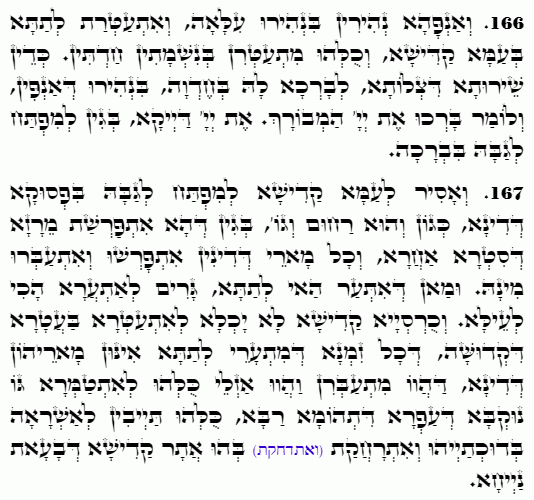Daily Zohar # 4793 – Terumah – Shabbat removes all forces of judgment
Daily Zohar 4793

Hebrew translation:
167. וְאָסוּר לָעָם הַקָּדוֹשׁ לִפְתֹּחַ אֵלֶיהָ בְּפָסוּק שֶׁל דִּין, כְּמוֹ וְהוּא רַחוּם וְגוֹ’, מִשּׁוּם שֶׁהֲרֵי נִפְרְדָה מֵהַצַּד הָאַחֵר, וְכָל בַּעֲלֵי הַדִּינִים נִפְרְדוּ וְהָעָבְרוּ מִמֶּנָּה. וּמִי שֶׁמְּעוֹרֵר אֶת זֶה לְמַטָּה, גּוֹרֵם לְעוֹרֵר כָּךְ לְמַעְלָה, וְהַכִּסֵּא הַקָּדוֹשׁ לֹא יָכוֹל לְהִתְעַטֵּר בַּעֲטֶרֶת קְדֻשָּׁה. שֶׁכָּל זְמַן שֶׁמִּתְעוֹרְרִים לְמַטָּה אוֹתָם בַּעֲלֵי הַדִּין שֶׁהָיוּ מָעֳבָרִים וְהָיוּ הוֹלְכִים לְהִתְחַבֵּא בְּתוֹךְ הַנֶּקֶב שֶׁל הֶעָפָר שֶׁל הַתְּהוֹם הַגָּדוֹל, כֻּלָּם שָׁבִים לִשְׁרוֹת בִּמְקוֹמָם, וְהַמָּקוֹם הַקָּדוֹשׁ מִתְרַחֵק (וְנִדְחָק) בָּהֶם מִלִּהְיוֹת בִּמְנוּחָה.
.
Zohar Terumah
Continued from previous DZ
#166
Her face, meaning her upper three Sefirot, shines with the supernal light, and she is crowned with the holy people below, for they all receive new souls from her. At that time, the beginning of prayer is to bless her with joy, with illumination of the face, by reciting: “בָּרְכוּ אֶת ה’ הַמְבֹרָךְ” (Bar’chu et Hashem (YHVH) Ha’mevorach). “Bless Hashem, the Blessed One.” The word “אֶת” “et” is precise, as it refers to Malchut, which is called “Et” in order to begin the blessing with her.
#167
It is forbidden for the holy people to begin Shabbat prayers with a verse of judgment, such as “והוא רחום” “He is merciful…” (V’hu Rachum)” Because at this time, Malchut has already separated from the Sitra Achra, and all forces of judgment have been removed from her. For one who awakens judgment below causes it to be awakened above as well. And the Holy Throne (Malchut) cannot be adorned with the Crown of Holiness if, at the same time, those below are reactivating the forces of judgment. For until now, during the entrance of Shabbat, all the forces of judgment had vanished and had gone to hide in the hole of the deep abyss, due to the holiness of Shabbat. But when people awaken these forces from below, they return to their place as on a weekday, and by doing so, they push away the holy place (Malchut), which seeks rest and peace.
Notes:
Shabbat removes all forces of judgment, allowing Malchut to shine in divine holiness. Mentioning judgment (like V’hu Rachum) on Shabbat reawakens these forces, diminishing the peace and holiness of the day. The spiritual laws mirror physical laws—what we awaken below is awakened above. To maintain the purity of Shabbat, we must only speak and think in terms of peace, joy, and holiness. This teaches us that Shabbat is not just a day of physical rest but a time to align ourselves with divine peace, ensuring that no negativity is reintroduced into the world.
{||}

 Previous: Terumah
Previous: Terumah

